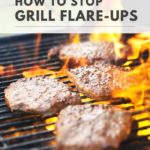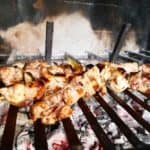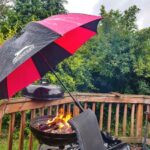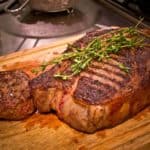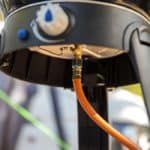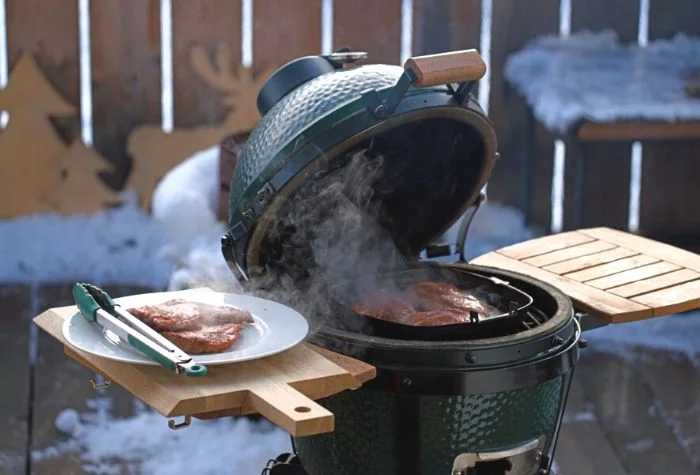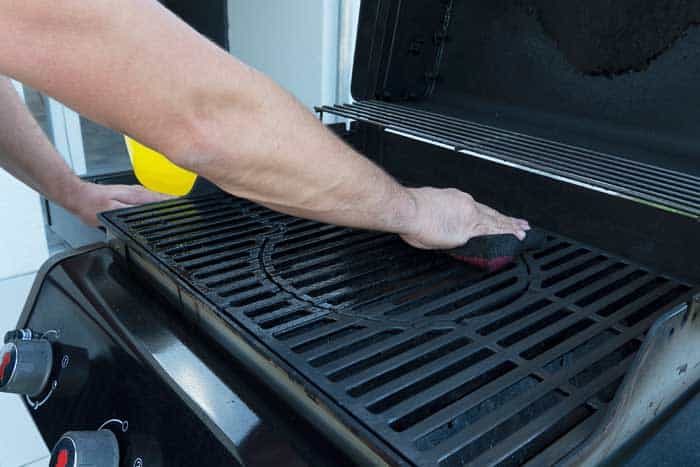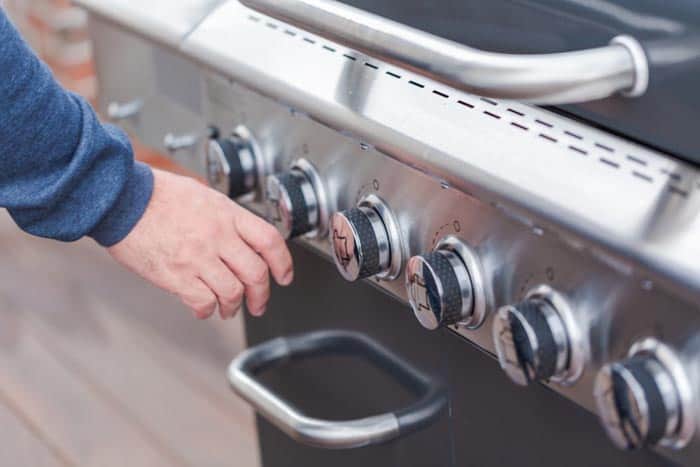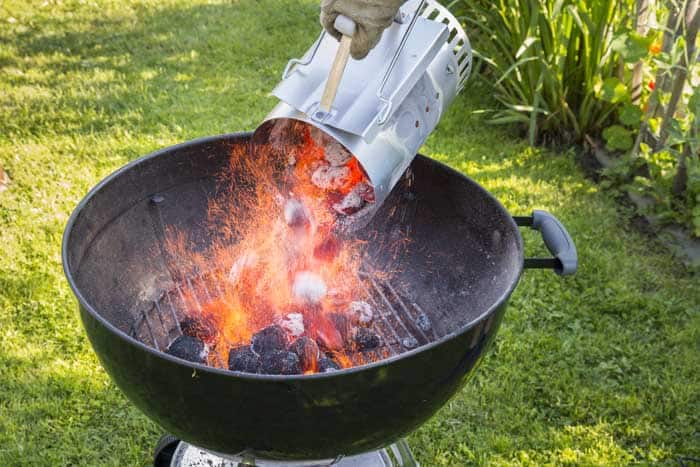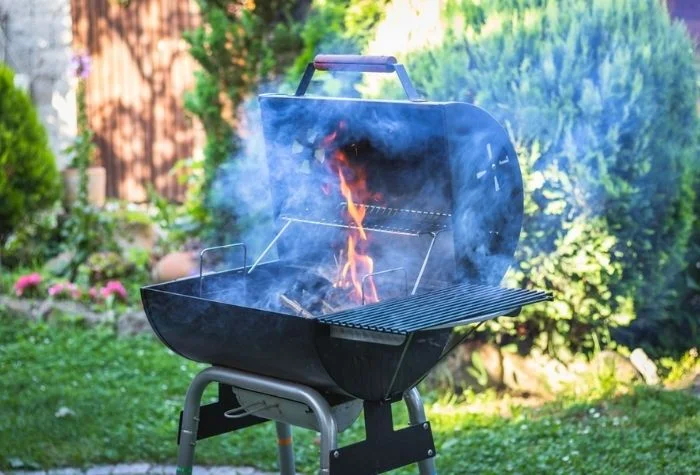Flare-ups on your charcoal or gas grill can charr and ruin your meat if you can’t control them. Learn the best ways to stop grease fires and grills flare-ups with our easy guide.
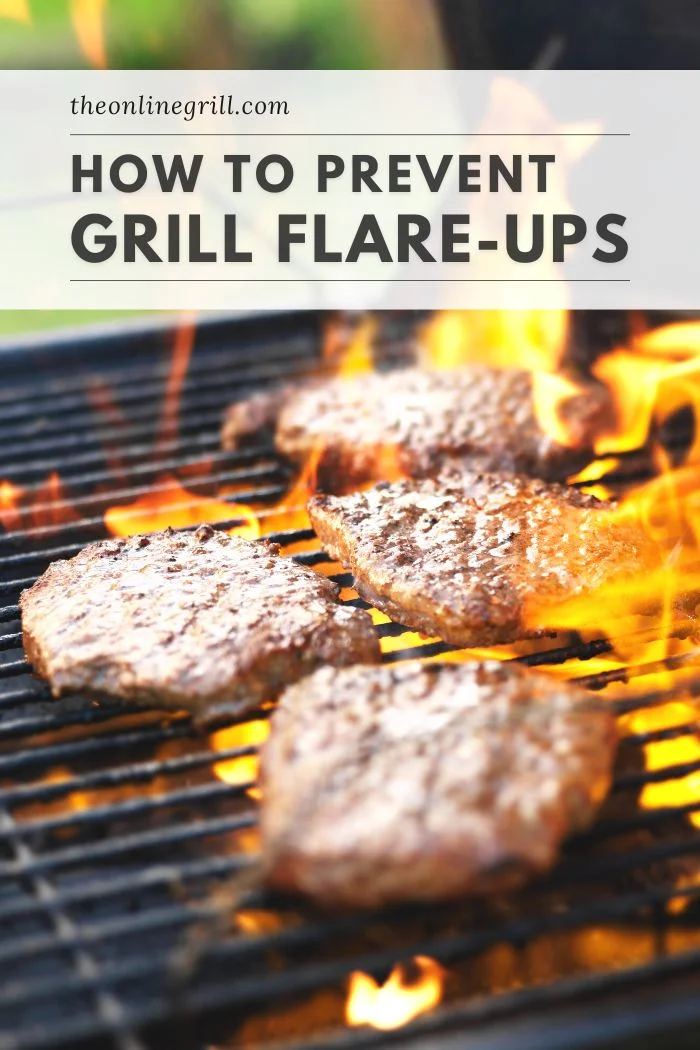
Most grill enthusiasts will know this story too well. You are having a good time, watching the glorious flame turning your meat into a spectacular feast. When all of a sudden it happens! The oil comes bubbling up towards you. We know the rest. Grilling food is excellent, but it also has its fair share of hazards and also disadvantages, not that these would dissuade me from grilling my food. In this article, we take a look at how to prevent grill flare-ups.
What is a flare-up?
Flare-ups are a common occupational hazard when you are grilling. This is especially true if you will be cooking meat that is fatty and can drip onto the heat source you are using. It’s unavoidable, but there are ways of controlling it. You may notice that you experience more outbreaks when there is grease build-up or after you have been cooking for a while and haven’t cleaned the grates.
A flare-up on a grill is often the result of dripping fat. It is spontaneous combustion that can hurt anyone close by. The sudden burst of flames usually doesn’t last long, depending on the amount of fat that would have dripped down and the grease builds up on the grates. In simple terms, it’s a grease fire, and it can ruin any type of grilled meat, from fresh reverse-seared T-bone steak to grilled frozen burgers.
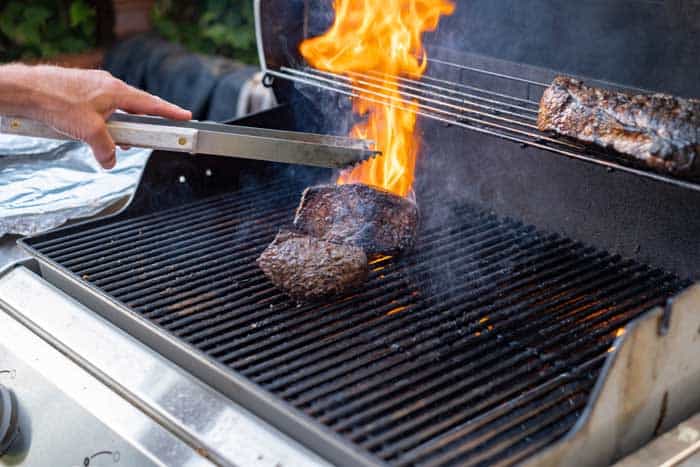
Characteristics
Now let’s look at what a typical flare-up should look like.
- It’s a large burst of flames that erupts within the grill and spreads fast.
- It usually happens when you flip the meat or when you first put the meat on the grill.
- It usually has black soot accompanying it.
- The flames rise high and will not subside when you remove whatever was on it. try not to do this
Causes
- We like to throw fatty pieces on the grill because they retain their juiciness when exposed to heat. But the fat dripping onto the flame can cause a flare-up. So if you will be cooking meat with high-fat content, like brisket, the risk of a grease fire is higher.
- Grease build up on a grill is one of the major contributors to hot spots across your cooking grates. If your grates go without cleaning for extended periods of time, the likelihood of a fire is increased.
- Outbreaks can also be caused by an oily marinade used. If you want your meat to remain juicy, then you will probably use oily marinades.
- High cooking temperatures can lead to more flame bursts.
- Outbreaks can also be caused by rust. If there is a build-up on flame tamers (if you have them) or even on the grates, then there is a high possibility that you will have to deal with more frequent flare-ups or sometimes even fires.
- Leftover debris in the greased pan. Any dried grease in the pan will melt when the heat is applied, eventually burning, causing the rise of flames and flare-ups. This is significantly easier when the pan is removable. Otherwise, you will need to find a cleaning tool that can reach the pan.
How to prevent flare-ups
While grill flare-ups are inevitable, they will happen from time to time, and for some, this is something to look forward to. It adds to the whole adrenalin rush of outdoor cooking. But not all flames are good flames. So let’s take a look at how you can avoid dealing with flare-ups altogether.
Fire management
When grilling using charcoal, flare-ups can be quite common. One of the ways to do this is to control the amount of fire. This is especially true when you use charcoal as a heat source for your grill. When fat hits the coals, it can create a sudden hot spot, but you can help prevent these occurrences when you control the amount of fire.
Clean your grill regularly
A dirty grill can also cause grill flare-ups. I know it can be a daunting task to clean the grill after slapping a couple of juicy steaks on there. But trust me, it gets harder when you don’t do it, and you let the grease build up over time. A build-up of grease simply gives the flames more to feed off of. Clean your gas grill regularly, and you may find that you will have fewer flare-ups as you grill. While you may not clean it after every cook, you may want to do it after at least three.
Find shelter from wind and rain.
Wind and rain are two weather elements that you may want to keep your grill away from to avoid flare-ups. Breeze simply fans the flames, giving them the strength to grow even more. As such, you need to try to keep the grill away. The rain will also only splash on the ash and mess up your food, rather than dealing with the flare-up.
You want to keep the grill away from anything that could fan the flames to give them more life. When putting out a grease fire, which is what a flare-up is in essence, you should never use water. The reason for this being that oil and water do not mix. When water(such as rain) splashes on a grease fire, it only serves to dissipate the grease and spread it even further, thereby spreading the fire. So pouring water on a grease fire is more harmful than it is helpful.
Keep the lid shut
Keeping the lid shut is a safety precaution. It is also a great way to make sure that you starve the fire of more oxygen. That is what makes it thrive. As such, when you cut off oxygen, you cause it to die down. You want to keep the flames away from anything that may fan it. Closing the lid can help deal with a small flare-up.
Move the meat
Suppose your meat is quite fatty and seems to be dripping down excessively onto the heat source. In that case, you may want to move the meat and continue cooking it over indirect heat. Think of it like cutting the oil dripping at the source.
Trim the fat on your meat
One of the major causes of grill flare-ups is dripping fat. Even though a fatty piece of meat means that it will be juicier when thrown on the grill, an excess of the fat also means that more drippings can cause flare-ups. To avoid this, you can simply choose to trim the fat in the meat. You don’t have to cut it out, but just trim it so that you get less fat on the meat.
Reduce the amount of oil you use
Flare-ups are also caused by oil dripping onto the grill and also onto the coals. A lot of marinades have some type of oil used in them. The oil then drips onto the coals and can be the potential cause of flare-ups. You can reduce the amount of oil used in the marinade. That way, you have less oil dripping onto the coals. Just remember that reducing doesn’t mean cutting out totally.
Turn off the burners
This method is mostly for gas grills. Gas burners have the advantage of totally switching off the moment that you turn the heat off. Unlike coals, which take some time to die down, gas burners immediately cool down when turned off. So turning the burners off will turn off the heat source. Any fat drippings from the meat or the marinade may drip but will not have anything to ignite it.
Cook over indirect heat
If you know that the meat you will be cooking has high-fat content and is likely to cause a flare-up, cook over indirect heat. This is the part of the grill that does not have any direct searing heat cooking it. This way, you avoid the fat dripping onto the heat source, which can cause a flare-up.
Do not poke or prod at the meat
I always thought that prodding sausage meat was the best way to know if it was cooked or not. It just looked like a lot of fun. However, this does not only dry the meat, but the juices that come from the sausage can cause a flare-up as they drip down. Sometimes, fatty sausages and meats will drip fat even without prodding it. It is important to closely watch the sausage and move it when the flames come up. Too many flames are how you wind up with a burnt piece of meat.
Flame tamers
You can also use flame tamers to control flare-ups. These are simply conical like shapes, which are placed over the burners. When fat drips down, it will hit the flame tamer rather than the burner and prevent a flare-up. For them to be effective, make sure that you clean them. You can do this using grease-cutting soap. This way, you remove the grease build-up.
This will also help to direct the excellent smoke towards the meat and give it the coveted smokey taste that you get from a grill. You also want to make sure there is no rust on the flame tamers. Rust can also encourage the occurrence of flare-ups. Hence why you need to keep the flame tamers clean.
Keep a close eye on the grill
It’s essential to keep a close eye on the grill as you cook so that you can quickly put out a fire as soon as it starts if it does. For your safety, always keep an extinguisher handy if a flare-up gets out of control. You want to be able to put out a fire at a moment’s notice.
How to put out a grease fire quickly and safely
Grease fires can be amongst the most dangerous. The reason being, most people rush for water to throw onto a fire to put it out. However, any fire caused by the oily substance should not be extinguished using water. As we have gone through the reasons above, a grease fire should never be put out using water. It only spreads it.
There are ways to put out a grease fire that are safe and convenient. When grilling, there is bound to be a certain amount of fat used, and this is one of the significant causes of grease flare-ups, which can quickly turn into a grease fire if left unchecked.
- The first thing you would want to do is cover the grill so that there aren’t any extra surprises. This will also starve the flames of oxygen.
- Then turn off the grill. With gas grills, this will be an instantaneous shutdown.
- You can use salt or baking soda to pour on the flames, to suffocate the fire. But this only works if they are considerably small flames. You must use salt or baking soda and nothing else. Any other kitchen ingredients may have ingredients that may fuel a grease fire rather than put it out. Baking soda has been named as one of the most effective ways of extinguishing grease fires. I like it because it is affordable and it is easy to get your hands on. It removes the oxygen from the fire and also smothers it.
- If the fire keeps raging, or if the flames are bigger than you thought, then grab your fire extinguisher. A chemical extinguisher is what you need to ensure the fire is adequately dealt with.
The Final Word
Grill flare-ups are a common occurrence with outdoor cooking. The flames may add to the whole spectacle of grilling, but they can be dangerous and may need to be kept in check. This is something to keep in mind when grilling. Safety first. Keep in mind all the precautions to take so that you end up with the perfect meal. Unnecessary flare-ups don’t char that.
I prefer to keep the temperature on the grill at an appropriate level and control the amount of fat I let on. I also find that keeping my grill clean saves a lot of headaches.
